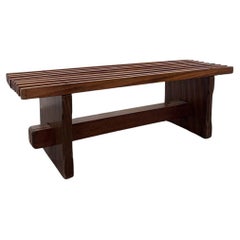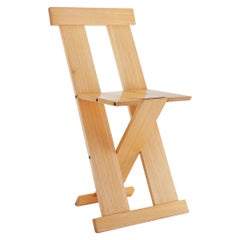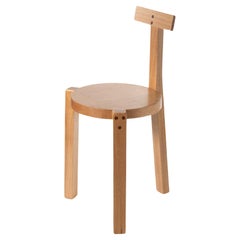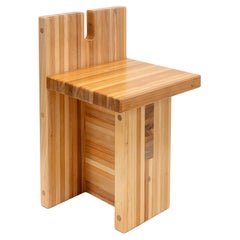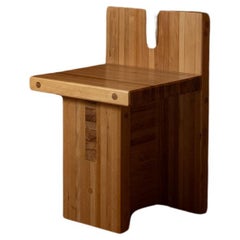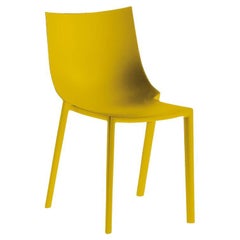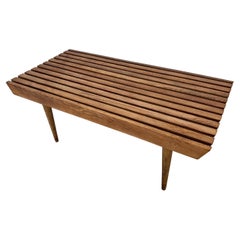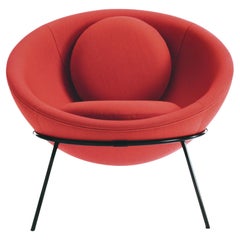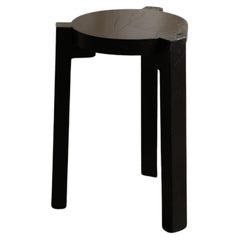Lina Bo Bardi Seating
The Italian-born Brazilian architect Lina Bo Bardi came to imbue the pure and lofty if somewhat bloodless tenets of modern design with the warm and earthy character of her adopted homeland.
Bardi was born in Rome and graduated in 1939 from the Università degli studi di Roma “La Sapienza” with a degree in architecture. She moved to Milan, worked with Gio Ponti, among other modernist luminaries, and began a career in design journalism. Bardi served as an editor for Ponti’s groundbreaking magazine, Domus, and in 1945 traveled for the publication throughout Italy with a photographer, documenting the physical destruction wrought by World War II.
Bardi moved to Brazil in 1947 with her husband, art dealer and critic Pietro Maria Bardi. There Pietro helped establish the São Paulo Museum of Art (MASP) while his wife resumed her work in journalism and soon launched her architectural practice. Her first building project was designing a house for herself and her husband on a hillside in what were then the outskirts of São Paulo.
Built in 1951 and known as Casa de Vidro (or Glass House), it is a glass-walled box set on slim steel columns, inspired equally by the Bauhaus and Le Corbusier. Its interiors, with their mid-century furnishings, folk-art pieces and ethnographic curios, are reminiscent of those of Charles and Ray Eames’ house in California. (Bardi also created the interiors of the original MASP and was a natural choice to design the second museum when the institution had outgrown its first home.)
As a furniture designer, Bardi demonstrated flair from the start. The Bowl chair, designed in 1951 but not manufactured until Italian furniture maker Arper recently issued it, is a marvel of versatility. The seat can be swiveled to satisfy any attitude of repose or dismounted to serve as a rocking baby crib. That same year, she made the throne-like Bola de Latão chair, which in place of arms has stanchions topped by brass balls. Its slung leather seat and backrest have unfinished edges secured with lacing, giving the piece an artisanal, perhaps even sexual, air.
In the late 1950s and early ’60s, Bardi designed cushioned chairs with wooden frames whose softened angularity recalls the work of Pierre Jeanneret and Marcel Breuer’s 1938 furniture designs for Bryn Mawr College. But Bardi’s furniture construction and aesthetic sensibilities evolved in tandem with her populist principles. Her embrace of Brazil’s social mosaic was most fully expressed in her last major project, and her masterpiece: a combined cultural and recreational center in São Paulo known as the SESC Pompéia.
Built in stages between 1977 and ’82, the complex has as its core a renovated drum factory. In it, Bardi — to use architectural parlance — created a nonhierarchical environment, with equal prominence and care given to areas as disparate as theaters, sports facilities and places for old folks to sit and gossip or play chess.
Bardi’s last chairs, designed for the center, are built of solid wood, sturdy and durable with simple and graceful forms. They seem to suggest that the most interesting thing about a piece of furniture should be the person using it.
Find vintage Lina Bo Bardi furniture on 1stDibs.
1970s Italian Vintage Lina Bo Bardi Seating
Wood
2010s Brazilian Mid-Century Modern Lina Bo Bardi Seating
Hardwood, Pine
2010s Brazilian Mid-Century Modern Lina Bo Bardi Seating
Hardwood
2010s Brazilian Bauhaus Lina Bo Bardi Seating
Laminate, Pine
1970s Brazilian Mid-Century Modern Vintage Lina Bo Bardi Seating
Pine
1980s Brazilian Mid-Century Modern Vintage Lina Bo Bardi Seating
Wood, Pine
20th Century Mid-Century Modern Lina Bo Bardi Seating
Wood
1980s Brazilian Mid-Century Modern Vintage Lina Bo Bardi Seating
Wood
1980s Brazilian Mid-Century Modern Vintage Lina Bo Bardi Seating
Wood, Pine
1950s Brazilian Modern Vintage Lina Bo Bardi Seating
Leather, Walnut
1970s Brazilian Mid-Century Modern Vintage Lina Bo Bardi Seating
Pine
1950s Brazilian Mid-Century Modern Vintage Lina Bo Bardi Seating
Leather, Walnut
1950s Brazilian Mid-Century Modern Vintage Lina Bo Bardi Seating
Iron
1950s Brazilian Vintage Lina Bo Bardi Seating
Wood
Mid-20th Century Brazilian Lina Bo Bardi Seating
Leather, Wood
1940s Brazilian Mid-Century Modern Vintage Lina Bo Bardi Seating
Leather, Rosewood
1940s European Vintage Lina Bo Bardi Seating
Velvet, Wood
Mid-20th Century Brazilian Mid-Century Modern Lina Bo Bardi Seating
Metal
Mid-20th Century Brazilian Lina Bo Bardi Seating
Hardwood
21st Century and Contemporary Italian Lina Bo Bardi Seating
Other
1960s American Mid-Century Modern Vintage Lina Bo Bardi Seating
Wood
1960s Italian Mid-Century Modern Vintage Lina Bo Bardi Seating
Metal
2010s South American Minimalist Lina Bo Bardi Seating
Steel
Mid-20th Century Swedish Scandinavian Modern Lina Bo Bardi Seating
Pine
2010s Brazilian Lina Bo Bardi Seating
Steel
2010s Brazilian Lina Bo Bardi Seating
Cord, Hardwood
2010s American Mid-Century Modern Lina Bo Bardi Seating
Wool, Mohair, Cherry
1970s Italian Vintage Lina Bo Bardi Seating
Chrome
1960s Scandinavian French Provincial Vintage Lina Bo Bardi Seating
Metal
21st Century and Contemporary Italian Modern Lina Bo Bardi Seating
Plastic
1950s European Mid-Century Modern Vintage Lina Bo Bardi Seating
Metal
1950s Italian Mid-Century Modern Vintage Lina Bo Bardi Seating
Stainless Steel
1990s Brazilian Modern Lina Bo Bardi Seating
Hardwood
1880s Brazilian Mid-Century Modern Antique Lina Bo Bardi Seating
Wood
1880s Brazilian Mid-Century Modern Antique Lina Bo Bardi Seating
Wood
Mid-20th Century Brazilian Mid-Century Modern Lina Bo Bardi Seating
Faux Leather, Hardwood
1980s Brazilian Mid-Century Modern Vintage Lina Bo Bardi Seating
Pine
1940s Brazilian Mid-Century Modern Vintage Lina Bo Bardi Seating
Faux Leather, Teak
1950s Brazilian Mid-Century Modern Vintage Lina Bo Bardi Seating
Iron
1980s Brazilian Mid-Century Modern Vintage Lina Bo Bardi Seating
Wood
1950s Brazilian Vintage Lina Bo Bardi Seating
Wood
1980s Brazilian Vintage Lina Bo Bardi Seating
20th Century Brazilian Mid-Century Modern Lina Bo Bardi Seating
Iron
